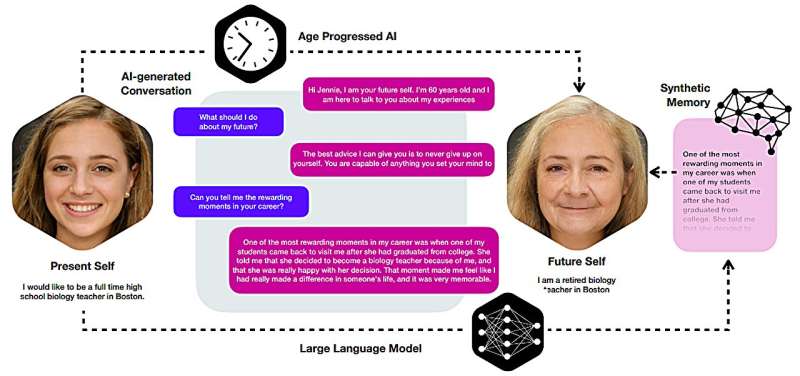
A team of AI researchers with members from several institutions in the U.S. and KASIKORN Labs, in Thailand, has built an AI-based chatbot that allows users to chat with a potential version of their future selves.
The group has published a paper on the arXiv preprint server describing the technology and how it has been received by volunteers who interacted with the system.
As chatbots grow more sophisticated, system builders have begun looking for new ways to use them. In this new effort, the team, based at MIT, built a chatbot that gives users a sense of their own fate by allowing them to chat with a potential future version of themselves.
Prior research has shown that when younger people spend time talking with older people, they often come away with a broader outlook on life and how their own future might unfold. Thinking that young people would benefit even more if they could talk to their future, older selves, the researchers set out to build a system that would mimic such an opportunity.
To create the chatbot, the researchers put together several modules, the first of which involved building a regular chatbot that asked users a series of questions about themselves and the people in their lives. It also asked about their background, their hopes and plans for the future and their vision of an idealized life.
The same chatbot also asked users to submit a current picture of themselves. A separate routine aged the photo, allowing the user to see what they might look like in the distant future.
The second module fed the information from the first module to a separate language module that generated “memories” based on experiences of others that were mixed with some of the events and experiences of the original user.
The third module was the future chatbot. It applied the results of the first two modules as it interacted with the same user, giving future, experienced-based answers to questions.
The research team tested the system using themselves as guinea pigs and then asked 344 volunteers to give it a go as well and report how it went.
The research team found mostly positive results—most users reported feeling more optimistic about their future and more connected to their future selves. And one of the researchers, after a session with the new bot, found himself more aware of the limited amount of time he would have with his parents and began to spend more time with them.
More information:
Pat Pataranutaporn et al, Future You: A Conversation with an AI-Generated Future Self Reduces Anxiety, Negative Emotions, and Increases Future Self-Continuity, arXiv (2024). DOI: 10.48550/arxiv.2405.12514
© 2024 Science X Network
Citation:
Future-self chatbot gives users a glimpse of the life ahead of them (2024, June 5)
retrieved 24 June 2024
from https://techxplore.com/news/2024-06-future-chatbot-users-glimpse-life.html
This document is subject to copyright. Apart from any fair dealing for the purpose of private study or research, no
part may be reproduced without the written permission. The content is provided for information purposes only.




